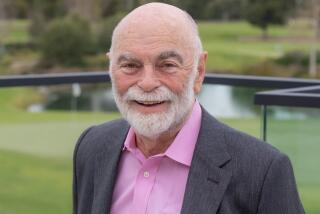Clash of the Hollywood Titans : Entertainment: Talent agency ICM takes on archrival CAA in a dispute over the latter’s consulting deal with the French bank that owns MGM.
- Share via
Public disputes are nothing new between stars in Hollywood, where parking a car without permission in comic Tom Arnold’s spot can spawn a week’s worth of headlines.
But among Hollywood’s powerbrokers, rivalries over business practices rarely surface in so public a way as they have within the last week.
Beginning last Friday, Jeffrey Berg and his International Creative Management talent agency have waged a tireless, all-out, public attack on archrival Michael Ovitz and his Creative Artists Agency.
The dispute is over a consulting pact CAA made with the French bank that owns the Metro-Goldwyn-Mayer studio. Berg says it is a conflict of interest. Ovitz disagrees.
Whoever is right, this unprecedented Clash of the Agency Titans has thrust ICM and Berg into a spotlight dominated lately by CAA, which has pioneered such non-traditional agency activities as advertising and even brokered a studio sale.
Berg is taking up the issue with just about anyone who will listen.
He has taken his case to newspapers, major news magazines, foreign publications and television.
He contends that it is inappropriate for CAA to advise Credit Lyonnais, given that the agency’s other clients do business with the studios and production companies controlled by or indebted to the French bank.
Though ICM is among the top Hollywood talent agencies--representing such stars as Eddie Murphy, Sharon Stone and Arnold Schwarzenegger--Berg is nowhere near as well known as Ovitz.
Once a behind-the-scenes operator who shunned the spotlight, Ovitz was discovered by the press in the mid-1980s, resulting in countless articles that have made him Hollywood’s best-known agent--”the most powerful man in Hollywood,” the epithet has it. As one studio executive put it, “Michael seems to have taken on mythic proportions.”
The lower profile left to ICM and Berg has prompted whispers this week that Berg’s real aim is to use the Credit Lyonnais dispute to trash Ovitz publicly, create a publicity windfall and raise doubts among CAA clients about whether they rank first in their agents’ hearts.
*
Berg, 45, the son of a television producer, bristles at suggestions that he is motivated by a personal rivalry with Ovitz, 46, or that he is trying to draw attention from CAA to his own agency.
“This is not me versus Mike. This is not ICM versus Creative Artists in any sense. This is a trade issue,” said Berg, who has worked in the talent business since graduating with a degree in English from UC Berkeley 24 years ago.
Clearly, though, Berg is attempting to draw out his rival, taunting Ovitz by publicly challenging him to a debate. He even has made sarcastic remarks about polar bears--a not-so-subtle reference to one of the highly publicized commercials that CAA recently created for Coca-Cola.
For its part, CAA, while defending the Credit Lyonnais arrangement, is keeping a low profile and refusing to be drawn into the fray. “We’ll let Mr. Berg’s tactics speak for themselves,” a CAA representative said.
Some in Hollywood suggest that Berg risks overplaying his hand if CAA rides out the publicity storm and fails to budge.
Berg believes that he is winning. He notes the scheduling of meetings Monday in which CAA will answer questions about the Credit Lyonnais arrangement for members of the actors, writers and directors guilds.
The CAA representative said Berg’s actions did not prompt the meetings.
At issue is an agreement under which CAA will consult with Credit Lyonnais on $3 billion in entertainment-related loans, many of them troubled.
Berg contends that CAA may have violated Screen Actors Guild rules, state labor regulations and federal rules governing competition. He says that CAA needs to disclose details of its agreement to the industry.
Berg also argues that CAA could gain access to confidential information about non-CAA clients. People in the entertainment industry, he adds, have a right to know if CAA has been retained to broker a sale of MGM, which Credit Lyonnais took over after former owner Giancarlo Parretti defaulted on his loans.
*
Credit Lyonnais must sell the studio by 1997 under U.S. banking laws.
For their part, CAA and Ovitz insist that the consulting agreement merely calls for the agency to advise Credit Lyonnais, a state-controlled bank based in Paris. They say CAA has no plans to influence MGM, Carolco or any of the other companies in which Credit Lyonnais has a stake or a credit relationship.
Needless to say, the controversy has raged through the industry this week, with opinions strongly divided over who is right and who will emerge in better shape.
One producer asked about the deal said he sees a clear conflict; another said he doesn’t.
One studio executive expressed some concern whether MGM might someday enjoy an unfair advantage on a project; another said he didn’t see it as a big deal, because agencies already represent producers.
More to Read
The biggest entertainment stories
Get our big stories about Hollywood, film, television, music, arts, culture and more right in your inbox as soon as they publish.
You may occasionally receive promotional content from the Los Angeles Times.










